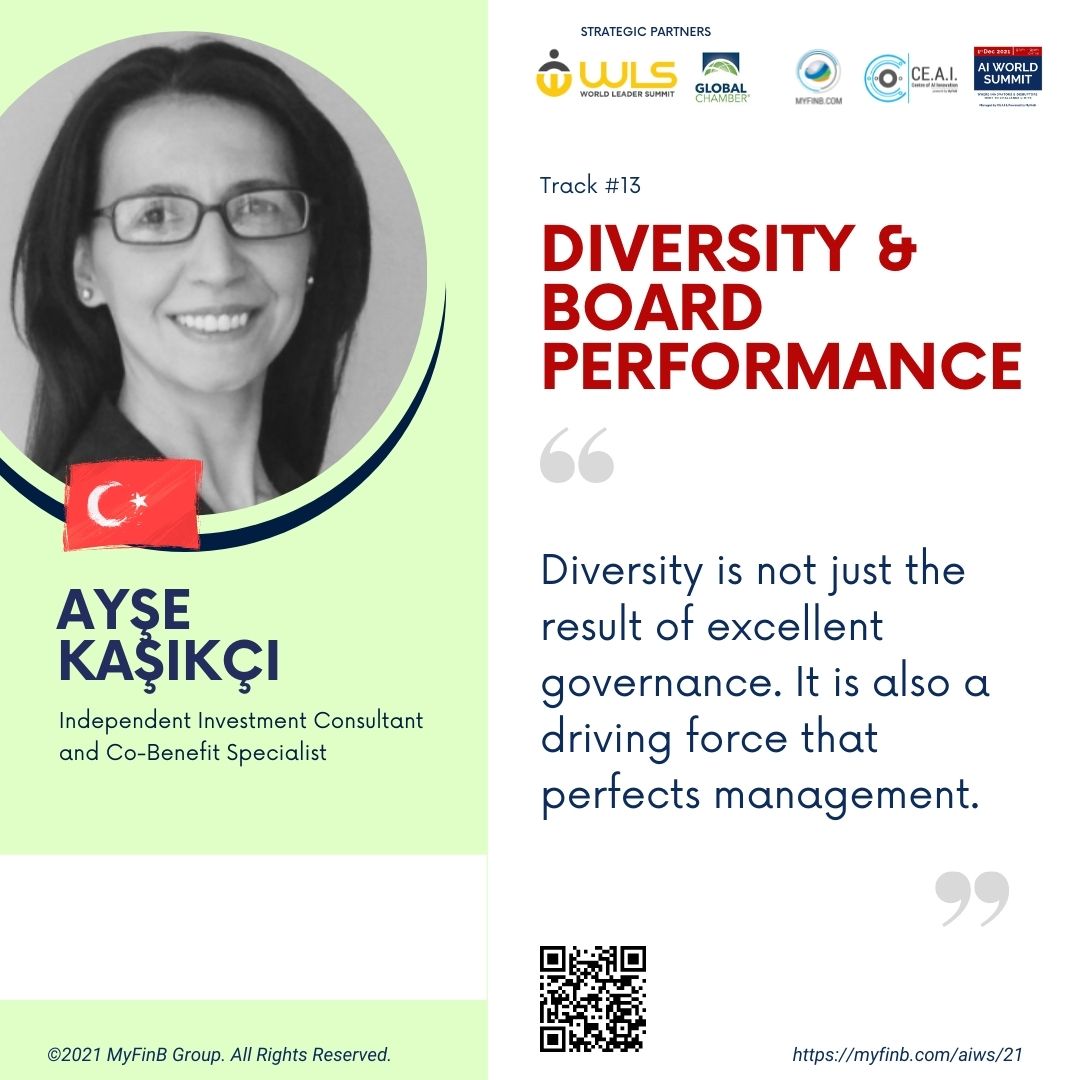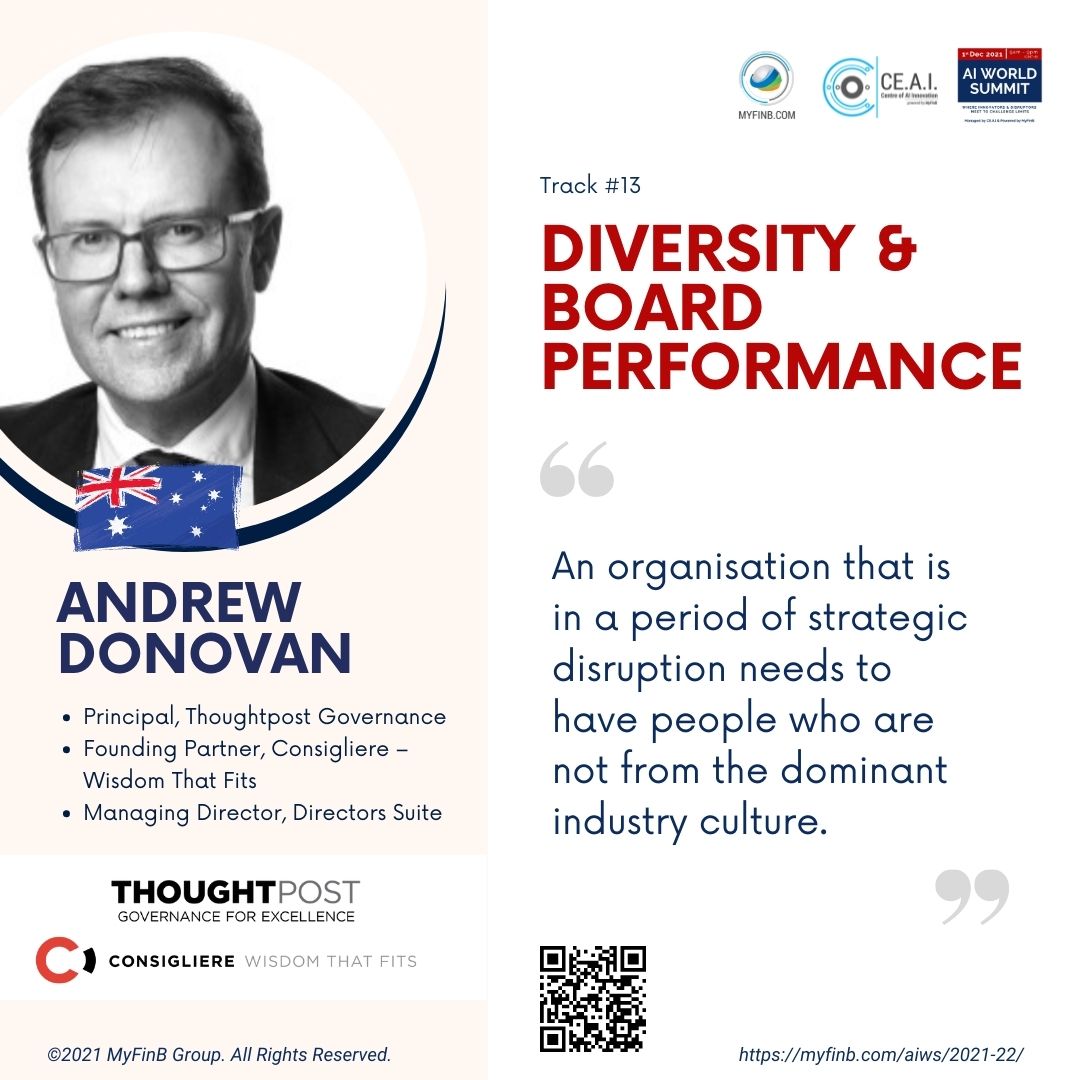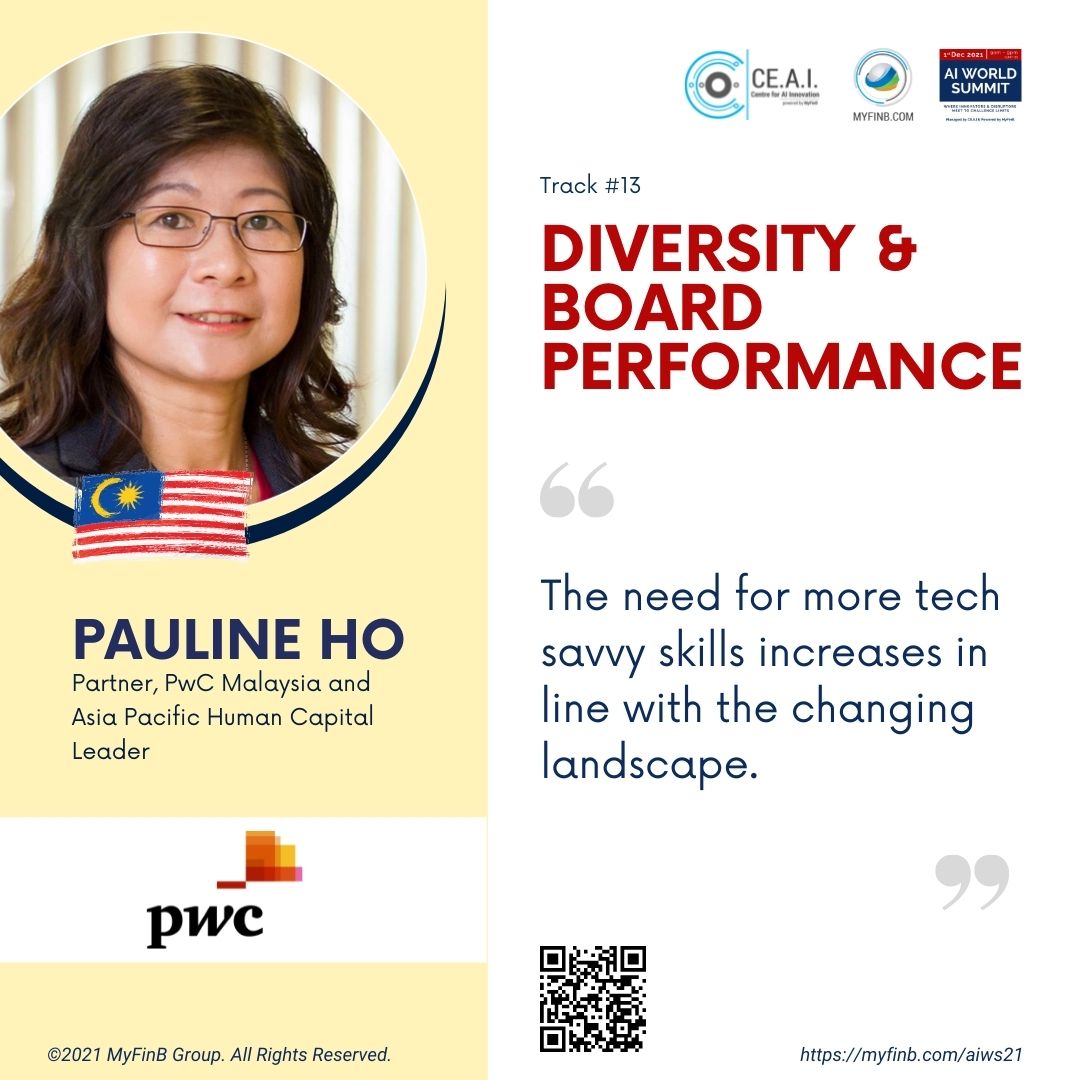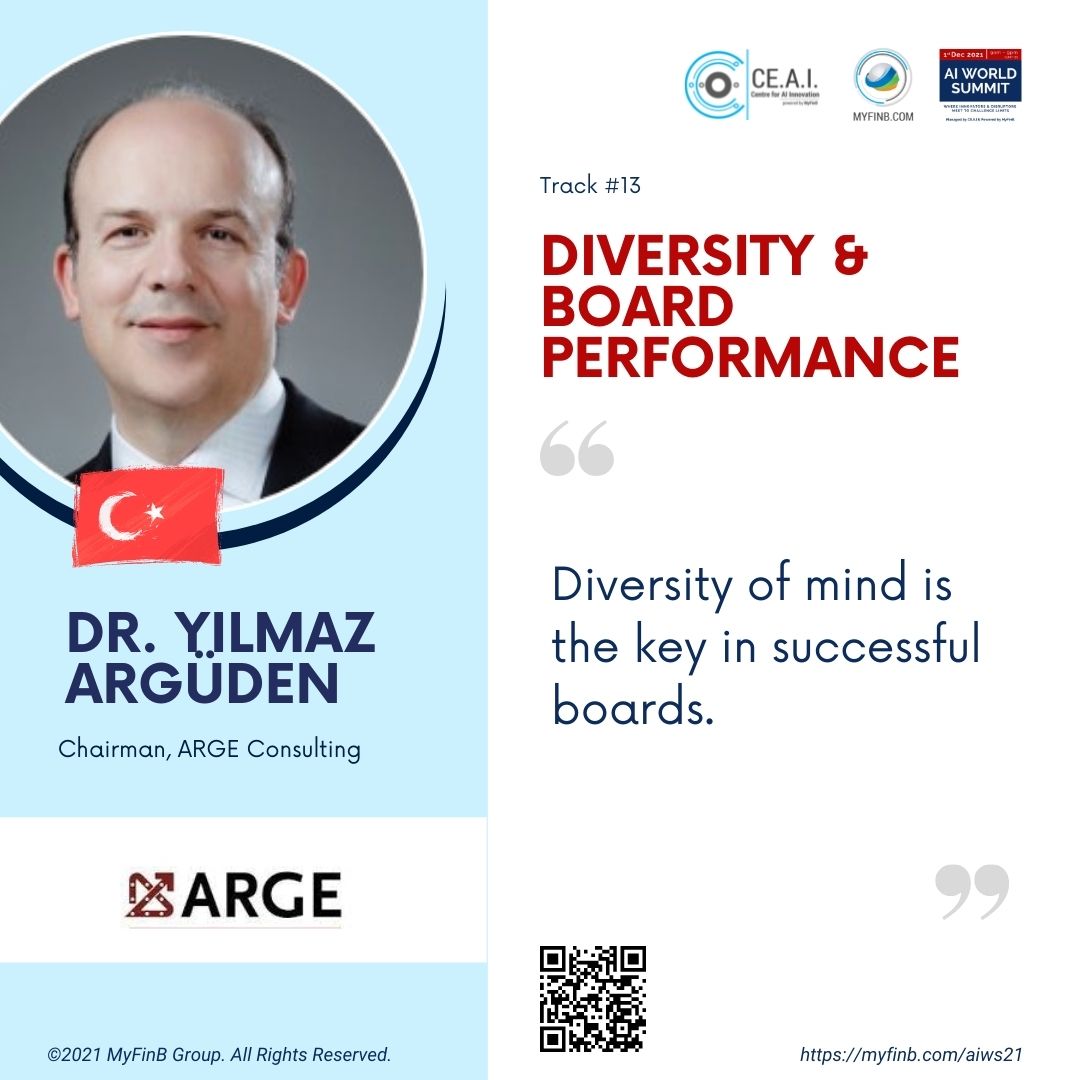AIWS'21 // Track #13
#13 - Diversity & Board Performance

Key discussion points
- Do diverse boards perform better? What are the factors to consider when using the measurement yardstick?
- How can board diversity be improved? How can technologies such as AI can help in the shortlisting and selection process?
- "Businesses that consciously seek board diversity might be going about it the wrong way. Board diversity is an outcome, not a driver, of excellent governance." Do you agree with this statement? Why or why not?
- If you were to piece up your own board, what kind of member characteristics that you would seek for your Team A?
Companies are broadening the range of backgrounds for board member positions, allowing them to attract more "diverse" directors - does this create more impact?
SPEAKERS & SAYS
Stay tuned. More speakers are sharing their perspective soon.

1. Do diverse boards perform better? What are the factors to consider when using the measurement yardstick?
It is common to find individuals with similar views, thinking and lifestyles on boards of directors. As such, performance evaluations can remain within standard patterns with similar results. But day by day, no company that wants to exist in the future has the luxury of fitting into standard molds. With the environmental awareness of the board of directors of every company that has long-term goals; must meeting the dynamics of the sector in which it works and the expectations of its investors; must respecting international values and all segments of society; it would be appropriate to approach innovations with an open mind and to be in a structure that can adapt to all of them. It would not be wrong to say that multi-faceted, multidisciplinary and diverse boards of directors with these understandings also achieve more successful results.
2. How can board diversity be improved? How can technologies such as AI can help in the shortlisting and selection process?
In order to develop diversity in the boards of directors, first of all, the positive and negative aspects of the existing structure should be determined. Improvements can be made by using technological tools such as AI, based on the main criteria that will be determined depending on the dynamics of the sector in which the company works and that I conveyed in the previous question. Artificial intelligence can assist the board in making lists, understanding the company’s business processes, keeping track of trends for company development, commitment, compliance, and analysis ability. Of course, since reporting with technologies such as AI can affect the board’s decision-making ability in the long run, evaluations should also be made with a self-control system that will perform the necessary care and follow-up.
3. “Businesses that consciously seek board diversity might be going about it the wrong way. Board diversity is an outcome, not a driver, of excellent governance.” Do you agree with this statement? Why or why not?
A.3. There are areas where I agree and disagree with this statement. Diversity is not just the result of excellent governance. It is also a driving force that perfects management. Diversity must be within the objectives of the board of directors. But if only diversity is aimed, as long as the company does not adapt to the dynamics of the sector; does not lead to positive results. In fact, I am of the opinion that positive results can be achieved if diversity is increased and seen as a tool to perfect the system, in line with the long-term goals of companies.
4. If you were to piece up your own board, what kind of member characteristics that you would seek for your Team A?
First of all, they can understand the sector we work in, follow trends and developments, are open to communication, harmonious, multidisciplinary, and have a life view; able to take initiative in a way that will provide common benefit when necessary; to consist of individuals who respect social values, the world they live in and the environment, I would like it.
– Ayşe Kaşıkçı – Independent Investment Consultant and Co-Benefit Specialist

I really don’t think we need to ask the question anymore. Do diverse boards perform better? They absolutely do. And all the data suggests that they do. I think the question that we do need to ask is what is diversity? I think we all accept that it is cognitive diversity, not sociological diversity, that is ethnicity, age, gender, et cetera, although those can be of cognitive diversity.
But what really matters in that is matching the cognitive requirements to the strategic context and the strategic need of the organisation. An organisation that is in a period of strategic disruption needs to have people who are not from the dominant industry culture. Likewise, a highly regulated, mature, undisrupted business doesn’t need to have a bunch of entrepreneurs.
So the linkage about diversity has to be a link to strategic need, not to diversity in and of itself. The main issue in addressing improving diversity on boardrooms and how AI might help is overcoming bias. The fact is that most of us want to spend time with other people like us. It’s what a colleague calls the ‘PLU’ syndrome, People Like Us.
AI has fantastic ability to, or opportunity I should say, to think through how to do that. I would point to something I mentioned at last year’s conference, that there’s a paper by academics from the university of Ohio State, Washington and Colorado who used publicly available data on firms, board and director characteristics to generate an AI algorithm called XG boost. The algorithm can accurately predict the success of individual directors, and in particular can identify which directors are likely to be unpopular with shareholders.
This is a quote from that research: “The differences between the directors suggested by the algorithm and those actually selected by firms, allows us to assess the features that are overrated in the director nomination process. It appears that firms choose directors who are much more likely to be male, have a large network, have a lot of board experience, currently serve on more boards, and have a finance background. A machine learning algorithm, which is much more sophisticated than the algorithms relied on by psychologists, would allow firms to improve their board selection process.”
Are boards going about diversity the wrong way? Yes, they definitely are. Einstein, I believe, said you can’t solve a problem with the same sort of thinking that created the problem. And that is where most boards go wrong, they try to address diversity from a non-diverse perspective, that is the current people on the board. So in terms of addressing that, which is a problem we all have, it’s a question of chicken and egg.
Yes, excellent governance will deliver diversity, but excellent governance requires diversity in the first place. So again, we need to find a catalyst that actually injects a different way of thinking into the board in the selecting directors going forward. And again, that’s where artificial intelligence has a role to play, but other factors have a role to play, different people, non-board members sitting on nominations committees of boards who actually bring in a different perspective, who challenge the dominant culture and paradigm can be useful.
If I was putting my own board together from the ground up then again, I would refer to my previous comments that it would be based on the strategic need of the organisation. So you would match it based on that need. And again, yes, sometimes it’s skill, but I’m much less interested in skill and more about the way that they think about the problems that the company is focusing on. Focusing on skill has a danger of building a second tier of management that is just trying to second guess management.
It’s actually the mindset that’s more important than the skill, perhaps a controversial concept. Having said that, in terms of generic capabilities that I’m looking for in every director, I think there are some. And that is, that there’s a range of perspectives that a good director who has the right mindset and ideally has the right skills in place can actually bring to bear.
First of all, it’s problem-solving. Secondly, it’s knowledge. Knowledge about the role, knowledge about understanding what their place is in an organisation as a director, as opposed to a manager or owner. They have to have curiosity. They have to have emotional and social agility, ability to roll with the dynamics that happen inside a board room, inside a board-management relationship.
They have to understand themselves and understand their relationship to other people. And they have to have this sense of responsibility, to see themselves as the guardians of an organisation, to stand outside their own self-interests and act for the benefit of the purpose of that organisation.

1. Do diverse boards perform better? What are the factors to consider when using the measurement yardstick?
A recent Institute of Corporate Directors Malaysia (ICDM) study analysed diversity in relation to gender, age, tenure, independence, culture, international expertise and domain/industry expertise. Results revealed that boards with at least one-third women representation displayed 38% higher median return on equity (RoE) than boards with no female representation.
Several factors need to be considered. The Malaysian Code on Corporate Governance (MCCG) 2021 recommends setting numerical targets with a proper mechanism to track performance against these targets, accompanied by supportive gender diversity policies. For me, organisations must set the wheels in motion by having a culture that nurtures diversity and inclusivity throughout the organisation.
2. How can board diversity be improved? How can technologies such as AI can help in the shortlisting and selection process?
Board diversity can be improved in several ways including:
- Utilising independent sources to identify potential board candidates. This means looking beyond referrals from management and board members or those within the same network/circle.
- Nomination committees should also be diverse to prevent groupthink and to call out any unconscious biases in the selection process.
- Identifying the area of focus to improve diversity and ensure that there are those who meet this diversity attribute in the pool of potential candidates for consideration e.g. inclusion of women candidates or those of different ethnicity or experiences.
AI can help in the shortlisting and selection process by identifying the candidates who match the criteria and removing unconscious bias in the selection process. However, the pool of candidates included in the selection itself must be selected independently with diversity in mind in order to achieve the greatest benefits. PwC’s 2021 Global AI Predictions survey highlighted that companies are taking steps to address the AI talent challenge, with 59% of companies developing a workforce plan that identifies new skills and roles needed as a result of AI.
3. “Businesses that consciously seek board diversity might be going about it the wrong way. Board diversity is an outcome, not a driver, of excellent governance.” Do you agree with this statement? Why or why not?
I believe that the statement represents 2 sides of the same coin. Governance is a continuous process and is demonstrated through every single decision that the board makes. In order to make well thought out decisions, diversity of thought and perspectives are of absolute importance.
For instance, there is a growing trend in boards in more developed economies having younger representation (50 years and below), as the need for more tech savvy skills increases in line with the changing landscape. For this reason, board members need to agree on a succession plan that prioritises the needs of the business and market, with a focus on building a healthy talent pipeline.
4. If you were to piece up your own board, what kind of member characteristics that you would seek for your Team A?
A key consideration is the nature of business and our customer demographics. Ideally, our board should comprise members from a diverse professional background with the experience to provide strategic oversight on the various functions of the business. They should also be socially diverse to share their perspectives on the varying needs of our clients and our people.
– Pauline Ho – Partner, PwC Malaysia and Asia Pacific Human Capital Leader

1. Do diverse boards perform better? What are the factors to consider when using the measurement yardstick?
Diversity of mind is the key in successful boards. Diversity should not be only evaluated by the proxies such as gender or race. Diversity of age, tenure, experience, functional expertise also play a role. However as the boards need to work as a team, not only as a list of experts from different fields, I believe that having had balance sheet responsibility should be a key requirement. Then we need to identify the key risks and challenge the company is likely to face in the mid-term and seek to increase diversity of mind and experience around these risk-challenge areas. Another key factor in benefiting from diversity is to make sure that the board members respect each other’s skills and experience in order to be able to review key strategic decisions from multiple perspectives, but in the end come to joint understanding and have the ability to come to conclusion to make decisions as a team.
2. How can board diversity be improved? How can technologies such as AI can help in the shortlisting and selection process?
AI could particularly be useful in identifying diversity of experience and ability to work as a team.
3. “Businesses that consciously seek board diversity might be going about it the wrong way. Board diversity is an outcome, not a driver, of excellent governance.” Do you agree with this statement? Why or why not?
Diversity should not be pursued for the sake of diversity. Especially trying to have representatives from different pools of individuals should not be the goal of boards, rather the key is having sufficient experience and mind diversity to be able to provide better environment to challenge proposals, but in the end to be able to have sufficient rust among the board members to come to decisions.
4. If you were to piece up your own board, what kind of member characteristics that you would seek for your Team A?
I would seek diversity of experience in each individual as well as among individuals, but also experience of having balance sheet responsibility as an indicator of making choices under uncertainty after having considered alternatives from multiple angles. As the multiplicity of angles and their importance is increasing, I would prefer to have individuals who have worked in different sectors and even domains such as public sector, NGOs, multinational organizations, as well as having assumed corporate responsibilities, preferably in different industries. Another key characteristic to be sought is the ability to provide coaching rather than trying replace the decision framing and making responsibilities of the executes and the CEO.
– Dr. Yılmaz Argüden – Chairman, ARGE Consulting
